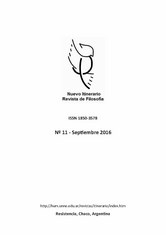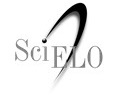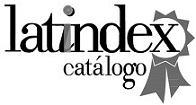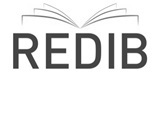Anthropological and semiotic study of the final myth of the Phaedo dialogue
DOI:
https://doi.org/10.30972/nvt.1926999Keywords:
Mythology, oral tradition, greek culture, racionalism, ancient philosophyAbstract
The objective of this work is to account for the cultural complexity present in the final myth of the Phaedo dialogue. The proposal is carried out through an anthropological and semiotic analysis. With the first, the relationship that mythological narration has with cultic practices and mystery rites is exposed. With the second, it is possible to explain the way in which the myth is intertwined with the argumentative passages (those of the logos), with the oral stories and with the traditional narratives of Greek culture. In turn, this interpretation is contrasted with the interpretation of the myth that presents it in the rational/irrational opposition, for which it is either a fantastic creation to illustrate what reason cannot, or as a type of justification of certain affirmations belonging to the argumentation of a thesis. It will be demonstrated that this conception is in solidarity with the nickname of eschatological myth, a concept that conceals its real link with the mythological tradition prior to Plato. And, at the same time, it is evident that that interpretation presents a semiotically simplistic version of the complexity of media dialogues in general.
References
Annas, J. (1982). Plato's Myths of Judgement. Phrónesis, v. 27 (2), 119-143.
Apolodoro (1985). Biblioteca (m. Rodríguez de Sepúlveda, Trad.). Madrid: Gredos.
Apolonio de Rodas (1996). Argonáuticas (M. Valverde Sánchez, Trad.). Madrid: Gredos.
Aristófanes (2007). Comedias III. Lisístrata. Las tesmoforias. Las ranas. La asamblea de mujeres. Pluto (L. M. Macía Aparico, Trad.). Madrid: Gredos.
Bernabé Pajares, A. (2008). Fragmentos presocráticos. De Tales a Demócrito (Bernabé Pajares, A., Trad.). Madrid: Alianza Editorial.
Bernabé Pajares, A. (2011). Orfeo y la filosofía. Hypnos, n. 27, 183-204.
Bernabé Pajares, A. (2016). Fedón, 69c: ¿Por qué los βάκχοι son los verdaderos filósofos? Archai. n.16, 117-142.
Brisson, L. (1998). Plato, the Myth Maker (G. Naddaf, Trad.). Chicago: The University of Chicago Press.
Brisson, L.; Tihanyi, C. (2008). How Philosophers Saved Myths? Allegorical Interpretation and Classical Mythology. Chicago: The University of Chicago Press.
Bordoy, F. C. (2013). Los relatos escatológicos en Platón: entre el logos y el mito. Humanitas, 65, 71-86.
Buis, E. J. (coord.) (2017). Derecho griego antiguo. Ciudad Autónoma de Buenos Aires: UBA.
Burkert, W. (1972). Lore and Science in Ancient Pythagorean (E. L. Minar Jr., Trad.). Cambridge: Harvard University Press.
Burkert, W. (2001). Mito e mitologia (M H. da Rocha Pereira, Trad.). Lisboa: Perspectivas do Homem.
Burkert, W. (2005). Cultos mistéricos antiguos (M Tabuyo y A. López, Trads.). Madrid: Trotta.
Collobert, C.; Destrée, P.; Gonzalez, F. J. (2008). Plato and Myth. Leiden: Brill.
Diodoro de Sicilia (2001). Biblioteca Histórica. Libros I-III (F. Parreu Alasá, Trad.). Madrid: Gredos.
Diodoro de Sicilia (2004). Biblioteca Histórica. Libros IV-VIII (J. J. Torres Esbarranch, Trad.). Madrid: Gredos.
Diógenes Laercio (2007). Vidas y opiniones de los filósofos más ilustres (C. García Gual, Trad.). Madrid: Alianza Editorial.
Eurípides (1991). Tragedias I. El Cíclope. Alcestis. Medea. Los Heráclidas. Hipólito. Andrómaca. Hécuba (A. Medina González y J. A. López Férez, Trads.). Madrid: Gredos.
Fränkel, H. (2004). Poesía y filosofía de la Grecia Arcaica (R. Sánchez Urtiz de Urbina, trad.). Madrid: La Balsa de Medusa.
Heródoto de Halicarnaso (1992a). Historia. Libro I (Clío) (C. Schrader, Trad.). Madrid: Gredos.
Heródoto de Halicarnaso (1992b). Historia. Libro II (Euterpe) (C. Schrader, Trad.). Madrid: Gredos.
Heródoto de Halicarnaso (2007). Historia. Libro IV (Melpómene) (C. Schrader, Trad.). Madrid: Gredos.
Heródoto de Halicarnaso (1989). Historia. Libro VIII (Urania) (C. Schrader, Trad.). Madrid: Gredos.
Homero (1996). Ilíada (E. Crespo Güemes, Trad.). Madrid: Gredos.
Homero (2019). Odisea (P. C. Tapia Zúñiga, Trad.). México D. F.: UNAM.
Jolles, A. (1969). Einfache Formen. Tubinga: Max Niemeyer Verlag.
Kingsley P. (1997). Ancient Philosophy, Mystery and Magic. Empedocles and Pythagorean Tradition. Nueva York: Oxford University Press.
Laks, A. (2010). Introducción a la filosofía “presocrática” (L. Iribarren, Trad.). Madrid: Gredos.
Laks, A. y Most, G. W. (2016). Early Greek Philosophy. Volume V. Western Greek Thinkers. Part 2 (A. Láks y G. W. Most, Trad.). Cambridge: Harvard University Press.
Larson, J. (2007). Ancient Greek Cults. Nueva York: Routledge.
Lotman, Y. (1979). La semiósfera I. Semiótica de la cultura y el texto (M. Cáceres, Trad.). Madrid: Ediciones Cátedra.
Lotman, Y. (1982). Estructura del texto artístico. Madrid: Istmo.
Macías, J. (2022). La asociación entre mythos y logos en el Fedón, o sobre cómo alcanzar el logos más difícil de refutar. Archai, n.32, 1-27.
Montanari, F.; Rengakos, A.; Tsagalis, C. (eds.) (2012). Homeric Contexts. Berlin: de Gruyter.
Partenie, C. (2004). Plato. Selected Myths. Oxford: Oxford University Press.
Pausanias (1994). Descripción de Grecia. Libros I-II. (M. C. Herrero Ingelmo, Trad.). Madrid: Gredos.
Píndaro (1984). Odas y Fragmentos (C. García Gual, Trad.). Madrid: Gredos.
Platón (1911). Plato's Phaedo. (J. Burnet, Trad.). Nueva York: Oxford at the Clarendon Press.
Platón (1933). Platon. Oeuvres Complètes. Tome IV – 3ra Partie. Phèdre (L. Robin, Trad.). Paris: Les Belles Lettres.
Platón (1985). Diálogos I. Apología, Critón, Eutifrón, Ión, Lisis, Cármides, Hipias menor, Hipias mayor, Laques, Protágoras (J. Calonge Ruiz, E. Lledó Iñigo, C. García Gual, Trads.). Madrid: Gredos.
Platón (1988). Diálogos III: Fedón, Banquete, Fedro. (C. García Gual, M. Martínez Hernández, E. Lledó Iñigo, Trads.). Madrid: Gredos.
Platón (2005). República (C. Mársico, Trad.). Ciudad Autónoma de Buenos Aires: Losada.
Platón (2010a). Plato. (G. S. Bowe y K. D. Otto, Trads.). Nueva York: Global Scholarly Publications.
Platón (2010b). Gorgias (M. I. Santa Cruz, Trad.). Ciudad Autónoma de Buenos Aires: Losada.
Platón (2010c). Fedro (A. Poratti, Trad.). Madrid: Akal.
Platón (2015). Banquete (E. Ludueña). Ciudad Autónoma de Buenos Aires: Colihue.
Pomeroy, S. B. et al. (2004). A Brief History of Ancient Greek: Politics, Society, and Culture. Nueva York: Oxford University Press.
Radcliffe, G. E. (2004). Myths of the Underworld Journey. Plato, Aristophanes, and the 'Orphic' Gold Tablets. Cambridge: Cambridge University Press.
Rodriguez Tobal, J. M. (2005). El ala y la cigarra. Fragmentos de la poesía arcaica griega no épica. (J. M. Rodriguez Tobal, Trad.). Madrid: Hiperión.
Santamaría Álvarez, M. A. (2008). Dos tipos de profesionales del libro en la Atenas clásica: sofistas y órficos. En M. P., Fernández Álvarez; E. Fernández Vallina; T. Martínez Manzano (coords.). Est hic varia lectio, la lectura en el mundo antiguo. (pp. 63-81). Salamanca: Ediciones Universidad de Salamanca.
Santamaría Álvarez, M. A. (2011). La transmigración del alma en Grecia. De Ferécides de Siros a Píndaro (Siglos VII-V a.C.) En: A. Bernabé; M. Kahle; M. A. Santamaría (eds.). Reencarnación. La transmigración de las almas entre Oriente y Occidente (pp. 233-267) Madrid: Abada Editores.
Schibli, S. H. (1990). Pherekydes of Syros. Nueva York: Clarendon Press.
Vernant, J.-P. (1973). Mito y pensamiento en la Grecia Antigua (J. D. López Bonillo, Trad.). Barcelona: Ariel.
Vernant, J.-P. (2003). Mito y sociedad en la Grecia Antigua (C. Gázquez, Trad.). Madrid: Siglo XXI.
Vishwa, A. (2013). Philosophy, Salvation, and the Moral Condition. En: A. Vishwa (ed.). Philosophy and Salvation in Greek Religion (pp. 1-28). Berlin: de Gruyter.
Downloads
Published
How to Cite
Issue
Section
License

This work is licensed under a Creative Commons Attribution-NonCommercial 4.0 International License.
Les autores ceden a Nuevo Itinerario los derechos de publicidad de sus trabajos, toda vez que hayan sido admitidos como parte de alguno de sus números. Ello no obstante, les autores retienen los derechos de propiedad intelectual y responsabilidad ética así como la posibilidad de dar difusión propia por los medios que consideren.












51.jpg)

